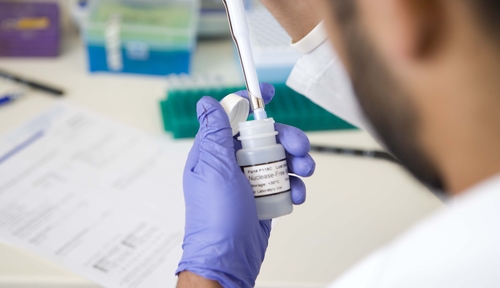Over the 30 years of its the bone marrow/stem cell transplantation program, researchers at University of Nebraska Medical Center and its hospital partner, The Nebraska Medical Center, have forged strong partnerships with researchers around the world. As a result, many patients come from all over the U.S. and world to see medical center experts.
One example of how research plays a critical role in advancing treatment and care of patients is a recent study that shed new light on T-cell lymphoma.
“We don’t see a lot of cases of this rare kind of lymphoma, so our partnership with others around the world is one way everyone can share to advance our knowledge and help patients,” said Julie Vose, M.D., chief of the Division of Hematology/Oncology. “T-cell lymphoma is more common in other parts of the world. It’s very important that we have the resources and expertise to be able to do these types of studies. There has not been adequate information on it.”
Several different clinical trials for T-cell lymphoma currently are ongoing.
Dr. Vose, also a physician on staff at The Nebraska Medical Center, was involved in an international study that looked at 1,300 cases of T-cell lymphoma to identify which treatments were helpful and which ones weren’t. In the United States, there are about 85,000 new cases of lymphoma annually of which about 10 percent are T-cell.
It produced surprising results.
“We found that our current treatments for T-cell aren’t very helpful and that we have to look for new treatments,” said Dr. Vose, the Neumann M. and Mildred E. Harris Professor. “We were surprised to learn patients did so poorly on current treatments. We also found some new types of T-cell lymphoma from genetic information that previously hadn’t been described.”
As a result of the study, she said there will be changes in treatment.
“It’s important to tailor treatment since not all T-cell lymphomas are alike,” she said. “Some are aggressive, some slow growing. Some patients do better with certain combinations of therapies while others do better with other types of treatment. We need to understand why.”
In the past few years, Dr. Vose said two new drugs have been approved for T-cell lymphoma.
She said treatment of lymphomas have come a long way in 30 years, thanks to research. There are 50 different types of lymphoma.
“Physicians used to treat many lymphoma patients with the same treatments,” she said. “We didn’t understand that different types of lymphoma can benefit from different types of treatment. Now we know.”
Through world-class research and patient care, UNMC generates breakthroughs that make life better for people throughout Nebraska and beyond. Its education programs train more health professionals than any other institution in the state. Learn more at unmc.edu.
-30-
